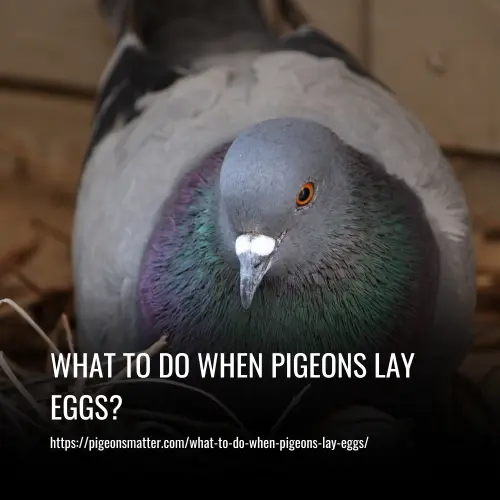What To Do When Pigeons Lay Eggs?
This post contains affiliate links. As an Amazon Associate, we earn from qualifying purchases.
When pigeons lay eggs, the best course of action is to let the eggs hatch and allow the parents to raise the chicks. Pigeons typically lay two eggs at a time, which will then be incubated for 18 days before the chicks emerge.
The parents will take care of the chicks for about a month before they are able to fend for themselves. If the location of the nest is inconvenient, it is also possible to remove the eggs and relocate the nest as you see fit.

When Do Pigeons Usually Lay Their Eggs
Pigeons typically lay their eggs in the spring, with the timing varying depending on the location. For example, in New York City, the pigeons usually lay their eggs between late March and early April. They typically lay two eggs at a time, and the eggs hatch after about 18 days.
Both the male and female pigeons take turns incubating the eggs and caring for the young pigeons, called squabs. Squabs are born with their eyes closed and are unable to fly, but they grow rapidly and are typically able to fly within six weeks.
How Many Eggs Does A Pigeon Typically Lay
Pigeons typically lay two eggs, which are then incubated for 18 days before hatching. The young, called squabs, are fed by their parents for another four to six weeks before they are able to fly and fend for themselves. In the wild, pigeons typically mate for life and will have one or two broods a year, with the female laying two eggs each time.
Both parents take turns incubating the eggs and feeding the squabs once they are born. Pigeons are found in every continent except Antarctica, and their populations are healthy and stable. Although considered pests in urban areas, they play an important role in the ecosystem by eating insects and other small animals.
What to Do If Pigeons Lay Eggs on Your Balcony
1. Removing the Nest and Eggs: To discourage pigeons from returning to your balcony, first, try to remove the nest and any eggs that may be present. You can do this by gently shaking the nest from the ledge or using a long pole to reach it. If the nest is attached to the building, you may need to call a professional for assistance.
2. Preventing Pigeons from Returning: Once the nest is gone, take steps to prevent pigeons from returning by making your balcony less inviting. Keep doors and windows closed so pigeons can’t enter, and block off any gaps where they might be able to squeeze through. You can also install bird spikes or netting around ledges to deter them from landing.
3. Cleaning Up Spilled Food or Water: Finally, don’t forget to clean up any spilled food or water that might attract pigeons in the first place. By keeping your balcony clean and uninviting, you can discourage pigeons from returning.
How Long Do Pigeons Sit on Eggs
Pigeon Incubation Period: Pigeons typically sit on their eggs for about 18 days, with some variability in the exact duration. The female pigeon usually does most of the sitting, but the male will take over for short breaks to allow the female to eat and drink.
Hatching and Development: Once the eggs hatch, the chicks are able to fly within a few weeks of hatching. This quick development allows the parents to focus on raising the chicks and preparing them for adulthood in a relatively short amount of time.
Do Pigeons Leave Their Eggs Unattended
Pigeons often build their nests in high places, like ledges or trees, and the female lays two eggs that hatch after 18 days. Once the chicks hatch, the parents take turns sitting on the nest to keep them warm and protect them from predators.
Pigeons sometimes leave their eggs unattended briefly, but this actually helps them stretch their legs and get some exercise. It also allows the chicks to move and strengthen their muscles before they fledge. So, while it may seem like the pigeons are neglectful parents, they’re actually giving their young ones a helping hand!
FAQs
If you find a pigeon egg, you can put it back in the nest if you know where it came from. If you can’t find the nest or don’t know where it came from, you can contact a wildlife rehabilitation center.
Baby pigeons are small and have soft, downy feathers. They are usually gray or brown with white patches on their wings.
Having pigeons lay eggs at home is considered a good sign and can bring prosperity and good news into your life. It is especially auspicious if the pigeons lay eggs in the balcony of your house. This may indicate that you will soon receive some good news or experience financial gain.
You can touch pigeon eggs without worrying about the parents rejecting them. The belief that birds will reject eggs or chicks due to human scent is a myth and has been proven false.
No, pigeons do not abandon their eggs if you touch them. Pigeons are very protective of their eggs and will only abandon them if they feel that they are in danger.
Conclusion
When pigeons lay eggs, it’s important to handle the situation with care and respect for the animals. Whether it’s providing a safe and comfortable environment for the pigeons to raise their young, or seeking professional help to relocate the nest if necessary, taking appropriate action is crucial.
It’s also important to be mindful of local laws and regulations regarding wildlife protection, and to always prioritize the well-being of the pigeons and their offspring. By being proactive and compassionate, it’s possible to handle the situation in a way that is beneficial for both the pigeons and the humans involved.